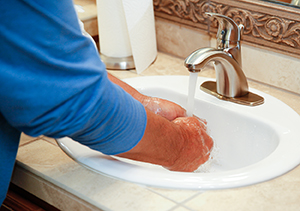Personal Hygiene Basics
Personal hygiene is about keeping your body clean and healthy. Good personal hygiene can make you less likely to become sick. It also helps you look and feel your best.
Wash your hands often
-
Always wash them after you use the toilet and before you eat or handle food. Wash more often if you are sick or are around a sick person.
-
When you wash, use plenty of soap and work up a good lather. Wash your hands in clean, running water. Scrub your hands for at least 20 seconds each time you wash. Be sure to clean under your nails and between your fingers. Rinse well.
 |
| Handwashing is the best way to keep disease from spreading. |
Keep your body clean
-
Take a shower or tub bath at least 2 to 3 times a week.
-
Clean your genitals, anal area, armpits, and skin folds every day.
-
Use moisturizing soap and water. Rinse and dry well.
-
Don’t put anything in your ears. Wash behind your ears every time you bathe.
Care for your mouth
-
Brush your teeth after each meal. Use a soft brush and fluoride toothpaste. Brush the front, back, and top of each tooth.
-
Brush your tongue each time you brush your teeth.
-
Floss at least once a day. You could use dental floss, floss picks, or dental picks. Floss between all teeth.
-
See your dentist every 6 months (or as often as you’re told) for a dental checkup.
Care for your nails
-
If you have diabetes or bad circulation (vascular disease), check with your healthcare provider about correct nail care.
-
Keep your nails trimmed and filed. Clean underneath them daily.
-
Cut toenails straight across. Trim them to just about the tip of your toe. Don’t cut the corners.
-
If you can't care for your own nails, ask others for help.
Helpful tips
-
See your healthcare provider if you have any health problems with your scalp, mouth, skin, hands, or feet. Examples are sores that don't heal or skin moles that change color or shape.
-
Keep your feet clean and dry. Wear clean socks as often as possible and well-fitting shoes.
-
Use moisturizing lotion to keep your skin soft and prevent cracking and peeling.
-
Women should always wipe from front to back when using the toilet.
-
If you have diabetes, your skin and feet need special care. Ask your provider about skin care and foot care.
Online Medical Reviewer:
Mahammad Juber MD
Online Medical Reviewer:
Marianne Fraser MSN RN
Online Medical Reviewer:
Sabrina Felson MD
Date Last Reviewed:
12/1/2024
© 2000-2024 The StayWell Company, LLC. All rights reserved. This information is not intended as a substitute for professional medical care. Always follow your healthcare professional's instructions.